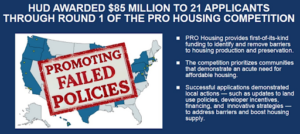AEI housing analysts Edward Pinto and Tobias Peter have alerted us that Kamala Harris’s slowly emerging policy agenda now includes a massive $40 billion slush fund for local governments to explore “innovative” housing solutions.
Such a program will likely funnel money into projects burdened by self-defeating government-mandated affordability requirements, which HUD loves but markets abhor. This will do more harm than good, as recent HUD program management failures illustrate below.
Pinto and Peter note that HUD’s existing program along these lines, the Pathways to Removing Obstacles to Housing (PRO Housing) awarded nearly $85 million in funding in FY23 promoting policy failures.

A few recent examples:
-
- Seattle received $5 million for its Mandatory Housing Affordability (MHA) program, which created hundreds of affordable units. However, HUD overlooked the thousands of units not built due to the constraints on small-scale townhome developers imposed by MHA regulations.
-
- Philadelphia was awarded $3.3 million for its $400 million bond program, the Neighborhood Preservation Initiative, despite the city reducing its successful tax abatement program that had revitalized the entire neighborhoods since 2000 without displacing residents.Instead of continuing this market-driven success, the city is now funding emergency repairs, down payment assistance, and security camera installations–drastically undermining the sustainable, long-term growth strategy that had proven effective for urban revitalization.
-
- The Twin Cities received $4 million for several municipalities that removed barriers to building 2-4-unit homes in single-family zoned areas. Yet, Minneapolis failed to increase the allowable floor area ratio, resulting in hardly any new 2-4-unit homes being built despite the change in zoning.
These are just three cases where HUD willfully ignores research to push its agenda of more subsidized affordable housing production and preservation that invariably crowds out private developers. A super-duper-sized version would create the same problems on a much bigger scale and would rife with waste, fraud, and abuse.
